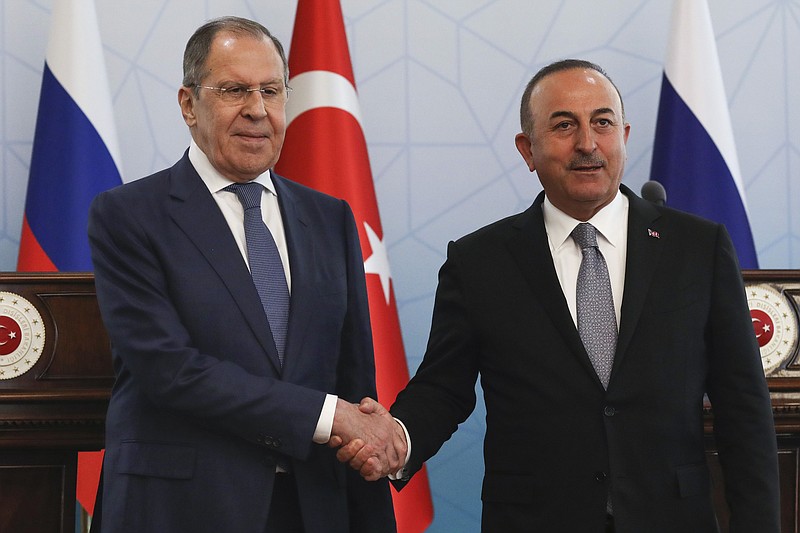By AYSE WIETING and SUZAN FRASER
Associated Press
ANKARA, Turkey (AP) -- Russia and Turkey voiced support Wednesday for a safe corridor in the Black Sea to allow Ukrainian grain exports, but Kyiv rejected the proposal, saying it was not credible. The European Union accused Moscow of "weaponizing" food supplies to gain an advantage in the war.
Russia also demanded that Ukraine remove mines from the Black Sea and both Moscow and Ankara said the West should ease sanctions on Moscow to allow the export of Russian grains amid an escalating world food crisis. While food exports are technically exempt from the sanctions, Russia claims that restrictions on its ships and banks make it impossible to deliver its grain to global markets.
Ukraine is one of the world's largest exporters of wheat, corn and sunflower oil, but Russia's invasion and a blockade of its ports have halted much of that flow, endangering food supplies to many developing countries, especially in Africa. Many of those ports are now also heavily mined.
U.N. Secretary-General Antonio Guterres has been working on a package for weeks that would allow Ukraine to export wheat and other commodities from Odesa and enable Russia to export grain and fertilizer to global markets.
But Russia and Turkey appear eager to dictate the terms and cement further control over the Black Sea. Turkey has maintained its close ties to both Ukraine and Russia. It has criticized Russia's invasion of Ukraine, but hasn't joined the international sanctions against Russia.
Russia has urged Ukraine to remove mines from the area near Odesa to allow safe grain exports, and Russian President Vladimir Putin pledged that Moscow wouldn't use the corridors to launch an attack. Both Ukrainian and EU officials cast doubt on the pledge; it was Putin who also insisted earlier this year that he had no plans to invade Ukraine.
But Russian Minister of Foreign Affairs Sergey Lavrov said Wednesday that Russia is ready to formalize the guarantee for Odesa. The Russian envoy promised that Moscow would not "abuse" its naval advantage if the mines were removed from Ukraine's ports and would "take all necessary steps to ensure that the ships can leave there freely."
Turkey says it would facilitate and protect the transport of the grain in the Black Sea.
Turkey depends heavily on Russian and Ukrainian wheat imports for its own food supplies and is eager to burnish its reputation in Africa, which has been severely affected by the food crisis, said Eleonora Tafuro Ambrosetti, a Milan-based research fellow at the Italian Institute for International Political Studies.
Russia, meanwhile, "is trying to portray itself as a country willing to compromise, to reach a deal," Tafuro Ambrosetti added.
The head of Ukraine's grain traders group scoffed at Turkey's effort to negotiate a deal.
"Turkey doesn't have enough power in the Black Sea to guarantee security of cargo and Ukrainian ports," Ukrainian Grain Union chief Serhiy Ivashchenko said Wednesday. He said it would take three to four months to remove sea mines, and also alleged that it was Russia that mined the area.
European Union officials emphatically pushed back Wednesday.
"Let's be very clear," European Commission President Ursula von der Leyen said at the European Parliament in Strasbourg, France. "Our sanctions do not touch basic food commodities. They do not affect the trading of grain or other food between Russia and third countries. And the port embargo specifically has full exemption on agricultural goods. So let's stick to the truth. It's Putin's war of aggression that fuels the food crisis and nothing else."
Ukrainian President Volodymyr Zelenskyy and Turkish President Recep Tayyip Erdogan discussed the creation of a safe sea corridor last week, the Ukrainian Foreign Ministry said Tuesday. The ministry also called for security guarantees, such as a supply of weapons to defend against maritime threats and the participation of NATO ships in the Black Sea.
Lavrov said Russia was willing to hold further talks but accused Zelenskyy of "changing his position all the time" over conditions for a leaders' summit.
